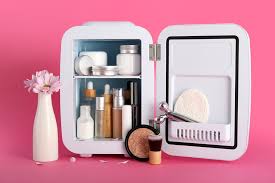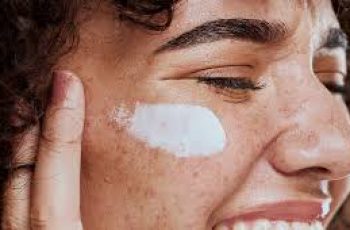
Which Skincare Products Should Not Be Refrigerated?
As a dermatologist, one of the most common questions I encounter is whether or not certain skincare products should be stored in the refrigerator.
This question became especially frequent during the rise of skin care refrigerators as a trend.
Additionally, it’s a concern that comes up during winter months, particularly when my patients are traveling to colder regions and wonder whether leaving their skincare products or sunscreens in their cars would affect their efficacy.
While I’m based in Miami where the weather is generally warm, the use of skincare refrigerators has grown in popularity even here, so it’s a topic I often discuss.
When considering whether to refrigerate your skincare products, it’s important to understand that while cold temperatures can help extend the shelf life of some ingredients like vitamin C or retinol,
not all products are suited for refrigeration.
In fact, cooling certain formulas may cause them to thicken or, even worse, destabilize, causing them to lose their effectiveness faster than if they were stored at room temperature.
So, which skincare products should you avoid refrigerating? As a general rule, creams and oils don’t fare well in the cold.
However, there are also specific ingredients that don’t respond well to lower temperatures, and I’ll be addressing these in greater detail as we go along.
The Refrigerator Debate: Should You Refrigerate Your Skincare Products?
Many people choose to stock up on skincare products when they find a good sale. They may wonder whether refrigerating these products can help extend their expiration dates.
While refrigeration is sometimes a viable option, it’s not the best choice for every product.
How to Store Skincare Products: General Guidelines
To get the longest shelf life out of your serums, moisturizers, and other skincare products, proper storage conditions are essential.
However, the optimal storage method really depends on the specific types of ingredients present in each product.
For example, a serum packed with antioxidants may react well to being chilled, while a ceramide-based cream could be damaged by low temperatures.
To understand the best storage method for each product, it’s helpful to know the reactions of different ingredient categories.
First and foremost, always check the product packaging. Most skincare brands will provide clear storage recommendations, including a suggested temperature range.
However, not all products will include such guidance. If you don’t see specific instructions, room temperature (around 15-25°C or 59-77°F) should be your default.
When in doubt, consider how the active ingredients within each product respond to temperature.
For instance, antioxidants like vitamin C and retinoids benefit from being chilled to slow down their natural breakdown due to heat and light exposure.
On the other hand, products containing lipids, such as oils and fatty alcohols, can suffer when exposed to cold temperatures.
These can solidify or undergo texture changes that ruin the consistency of the product.
Refrigerator Temperature: Too Cold for Some Products
The typical temperature range for a refrigerator is between 35 and 38°F (1.6-3.3°C). While slightly warmer settings may reach 40°F (4.4°C), this is still too cold for many skincare products.
Freezer Temperature: A Big No for Skincare
Freezer temperatures typically fall between -10 and 0°F (-23 to -18°C). Storing skincare products in the freezer should be avoided at all costs. Such low temperatures can lead to several problems:
Texture Changes: Many moisturizers will become so thick that they are difficult to apply. In some cases, they may even freeze.
Separation: Some products contain multiple ingredients that can separate or lose their uniformity when exposed to extreme cold.
Altered Efficacy: The active ingredients in some products may lose their potency or effectiveness when subjected to freezing temperatures.
Packaging Issues: The packaging itself can be affected by extreme cold. For example, plastic tubes and bottles may become brittle and crack, leading to leaks or contamination.
Products You Should Never Refrigerate
Here’s a list of skincare products that should never be refrigerated, as they are particularly susceptible to destabilization or texture changes:
Exosome Serums: Exosomes are tiny vesicles released by cells and are believed to have anti-aging properties. Refrigeration can negatively affect their stability.
Growth Factor Serums: Similar to exosome serums, growth factor-based products rely on delicate proteins that can break down if exposed to cold.
Peptide Serums: Peptides are fragile and can lose their efficacy in low temperatures. These products should be stored at room temperature to maintain their full potential.
Some other products, such as face creams, body creams, and lotions, can be refrigerated, but they may change in texture or even separate when subjected to very low temperatures.
It’s also a good idea to warm them up to room temperature before application to ensure smooth and effective use.
Storing Moisturizers, Ointments, and Lotions
When it comes to products like moisturizers, creams, and oils, refrigeration is usually not the best option for long-term storage.
Most creams and lotions rely on a delicate balance of oil and water, stabilized by emulsifiers and thickeners. Cold temperatures can disrupt this balance, leading to separation or changes in texture.
For example, when oil-in-water emulsions are chilled, they tend to become thicker and harder to spread. Conversely, water-in-oil creams risk separating.
Instead of refrigeration, it’s generally best to store these products in a cool, dark place away from heat and light, such as a closet.
The bathroom is often too warm and humid for long-term skincare storage.
Organic Skincare and the Fridge
Organic skincare products, which are often preservative-free, may not fare as well when stored for extended periods without refrigeration.
If you have organic skincare and won’t be using it for more than a few months, temporarily storing it in the fridge can help prevent microbial growth.
However, long-term storage in the fridge can alter the texture. Ideally, you should buy organic skincare fresh when you plan to use it, rather than stockpiling.
Ceramides and Lipids: Avoiding the Cold
Ceramides, fatty acids, and lipids are often used in moisturizers and barrier repair creams.
These ingredients are highly sensitive to cold temperatures and will solidify, crystallize, or break down when exposed to refrigeration.
Ceramides are waxy lipids that reinforce the skin’s moisture barrier.
When they’re exposed to cold, they tend to thicken and may even crystallize, leading to changes in the texture of the cream or serum.
Similarly, fatty acids, which are found in heavier creams, can solidify at lower temperatures. Saturated fatty acids, such as stearic and palmitic acid, are especially prone to this change.
Unsaturated fatty acids, on the other hand, can tolerate refrigeration better, but they still need to be allowed to return to room temperature before application.
Fatty Alcohols: Storing With Care
Fatty alcohols like cetyl alcohol and cetearyl alcohol are often used in skincare to thicken products and create smooth textures. Unfortunately, these alcohols also respond poorly to cold.
When exposed to low temperatures, they solidify, which can ruin the texture of creams and lotions. This is especially problematic for products that rely on these alcohols to maintain their consistency.
Retinol, Vitamin C, and Other Sensitive Ingredients
Certain ingredients are highly sensitive to temperature fluctuations. Retinol (and its derivatives like tretinoin) is one example.
This powerful anti-aging ingredient is highly unstable when exposed to light, heat, or air. Refrigeration can actually extend its potency, but freezing can destroy it completely.
Similarly, vitamin C (ascorbic acid) is highly prone to oxidation. Keeping it in the fridge can prevent this degradation, although newer formulations may not need refrigeration.
Hyaluronic acid, another common skincare ingredient, remains stable across a wide range of temperatures. However, refrigerating it can cause lower-quality formulations to thicken and become difficult to apply.
Sunscreens: Should You Refrigerate Them?
Sunscreens are best kept in a cool, dry place, away from direct sunlight. Extreme temperatures, whether hot or cold, can affect their stability.
Mineral sunscreens, which contain ingredients like zinc oxide or titanium dioxide, don’t need refrigeration, but storing them in the fridge may thicken the formula without improving its longevity.
On the other hand, chemical sunscreens may benefit from refrigeration, especially if they contain organic UV filters that degrade more quickly at higher temperatures.
Toners: To Chill or Not to Chill?
Alcohol-based toners are generally safe to refrigerate, as alcohol tends to mix well with water, even in cold conditions. However, non-alcoholic toners may become too thick when chilled.
Cold toners can feel refreshing, but it’s worth noting that cold temperatures can inhibit the absorption of other products applied afterward.
Ointments: Room Temperature Is Best
Ointments like Vaseline, Aquaphor, and antibiotic creams contain ingredients such as petroleum jelly and mineral oil, which are best stored at room temperature.
Storing them in the fridge makes them hard to spread and difficult to use.
Conclusion
In conclusion, the decision to refrigerate skincare products depends on the specific ingredients and the type of product.
While certain active ingredients like retinol and vitamin C benefit from refrigeration, many others, especially those containing lipids and fatty alcohols, do not.
For most skincare, a cool, dark place at room temperature is the optimal storage condition.
If you’re unsure about a particular product, always refer to the manufacturer’s storage recommendations to ensure it remains effective.
Let us help you find the best skincare products for your skin type!


